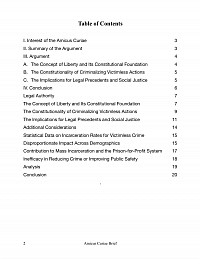Amicus Curiae Brief on Victimless Actions
I. Interest of the Amicus Curiae
Finding Camelot is an organization dedicated to enhancing the quality of life for the working class. By advocating for the protection of liberties fundamental to the United States we hope to bring attention to the issues that are adversely affecting the working classes. Our interest in this case arises from our commitment to challenging legal definitions and prosecutorial practices that, in our view, compromise the ability of individuals to pursue liberty.
This critique specifically examines the problematic nature of statutes that define crimes based on the potential for punishment rather than the actual harm caused. The notion that "if we can punish you for it, it's a crime; if it's a crime, we can punish you" presents a troubling departure from the principles of justice and individual liberty that underpin our constitutional framework. This legislative approach raises significant ethical and constitutional questions, suggesting a misalignment with the foundational values of our legal system.
It is imperative to question and reassess such statutes, ensuring that our laws align with constitutional protections and the evolving societal understanding of justice and individual rights. In drafting and enforcing laws, it is crucial to prioritize the actual harm and societal impact over arbitrary definitions of criminality. This approach not only respects the constitutional rights of individuals but also fosters a more equitable, rational, and humane legal system that truly serves the interests of justice and public welfare.
II. Summary of the Argument
This brief argues against the unjust penalization of actions that do not harm others, asserting that such practices infringe upon the foundational value of liberty protected by the Constitution. It focuses on the prosecution for possession of a small amount of marijuana, a case that highlights broader issues with the state's authority to define and penalize victimless so-called crimes. These crimes include a range of activities such as drug use for various purposes, gambling, and personal lifestyle choices. This prosecution raises important questions about personal freedom and justice.
We emphasize that a significant portion of the U.S. incarceration rate is due to victimless crimes, which is a misuse of resources and contributes to the growth of a profit-motivated prison industry. This industry supports stricter sentencing, worsening mass incarceration without improving public safety. Finding Camelot advocates for a reevaluation of laws that penalize victimless actions, calling for reforms that align with constitutional principles and enhance individual freedoms.
III. Argument
A. The Concept of Liberty and Its Constitutional Foundation
Liberty, as envisioned by the founders of our nation, encompasses the right to conduct oneself freely, without undue government restraint, especially in matters that do not harm others. This case provides a crucial context for re-examining how far the state’s authority should extend in defining and punishing victimless actions.
The pursuit of criminal charges for possession of substances, particularly those which are moving toward decriminalization across various states, echoes a historical resistance to change that prioritizes punitive measures over personal freedom and public health. The case at hand reflects a misalignment with evolving societal norms and understandings of liberty. It underscores the need for a legal framework that respects individual freedoms while focusing on harm prevention rather than punishment for victimless actions. This shift in focus would not only align with the constitutional principles of liberty and the pursuit of happiness but also with a more humane and effective approach to policy-making that recognizes the complexity of human behavior and the changing tides of public opinion and scientific understanding.
B. The Constitutionality of Criminalizing Victimless Actions
Criminalizing actions that do not result in harm to others oversteps the government’s legitimate authority, leading to unnecessary encroachments on personal freedom. Such laws not only strain the judicial system but also divert attention and resources from addressing actions that genuinely threaten public safety and well-being.
The prosecution under Wisconsin law of an individual for the possession of marijuana, based on evidence obtained through questionable means, exemplifies the overreach of criminal law into areas that fundamentally challenges the notion of personal liberty.
C. The Implications for Legal Precedents and Social Justice
The case of ****** *. ****** * highlights the broader issue of how the legal system can sometimes act in ways that unnecessarily penalize individuals for actions that do not harm others. A society that too readily encroaches upon the freedom of its citizens risks the very liberties it seeks to protect. Moreover, the enforcement of laws against these victimless actions disproportionately affects the most vulnerable among us, deepening societal divides and perpetuating cycles of poverty and marginalization. This situation calls for a comprehensive review and reform of laws and practices to ensure they are in harmony with constitutional mandates for liberty and justice for all.
IV. Conclusion
The amicus curiae urges the Court to consider the constitutional implications of criminalizing victimless actions and to recognize the importance of aligning legal practices with the principles of individual liberty and the pursuit of happiness. By acknowledging the need for reform, the Court can take a crucial step toward a more just and equitable legal system that respects personal freedom while maintaining public safety.
Respectfully Submitted,
/s/ Cassandra Davis
Cassandra Davis
Founder & Executive Director, Finding Camelot


